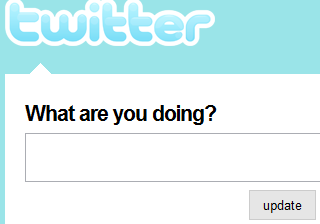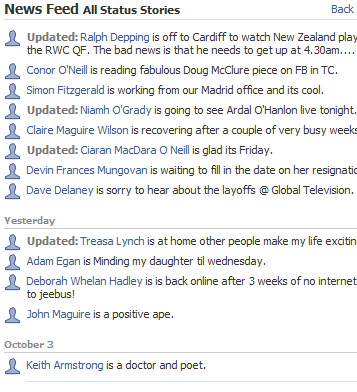Mobile, Email, IM, Bebo, LinkedIn, Facebook, even Twitter. Technology allowed us to connect with more people outside our traditional social groupings and allowed us to stay connected with all these new people. The bonds might not be as strong as those bonds with close friends and associates but each connection still taxes our time. Now we connect with people via email and IM and we’re adding more and more to those lists. MSN for years had an upper-limit of 150 people you could add. If you wanted to add anymore than that you had to cull your list. They got rid of that a few years ago and I think I have about 250 on my MSN list now with another 250 on Yahoo! IM and AIM. If I sign into Meebo now (which manages all my Instant Messaging accounts) I get a few messages from people straight away, sometimes I could have 20+ conversation windows open.
The trouble with many of these services, especially email and IM are they have to be answered, right? It’s rude not to respond to a text or an email or an IM and then there’s the guilt. Blackberrys have made this worse. They are evil. They create more email and just continue on the ping pong game instead of solving it. Programmes like Getting Things Done create new artificial rules on how to deal with the email onslaught but all they are really are new ways of filing the emails. You still need to deal with them and when you answer one email, you’ll get another. That’s why lots of people declare email bankruptcy. Same goes for blogs. As the numbers of visitors to blogs grow and the numbers of comments grow, the more you see people turn comments completely off as they just cannot manage and moderate all the comments. This happens especially once the trolls move in or what you discuss is in some way controversial.
There’s a number called the Dunbar Number which is derived from a theory that we as humans can form about 150 proper friendships or relationships with people and our brains can’t handle more than that. From the Wiki entry:
Dunbar’s number, which is 150, represents a theoretical maximum number of individuals with whom a set of people can maintain a social relationship, the kind of relationship that goes with knowing who each person is and how each person relates socially to every other person. Group sizes larger than this generally require more restricted rules, laws, and enforced policies and regulations to maintain a stable cohesion
Accidental or otherwise, features in the same technologies that are overloading us might help us out with this overload too. Status messages in GMail chat and MSN IM mean we can put quotes, song titles or statuses in that space. MSN is the one that really promoted this and you could actually get a summary of what people were up to without having to message them. It really was just a social hack but it worked well.
Broadcast is back. In the age of “conversation” and “markets are conversations” and “social objects”, where blogging is about a personal communication with people, it seems that because technology increased our native Dunbar number, we are failing to keep the relationships going and so services like Jaiku and Twitter are working on the status broadcast idea: In 140 characters or less, tell your collective contacts what you are doing or up to. It’s a broadcast and there is zero expectation for a reply.

Facebook too has a status, which Bebo also adopted. The status is probably one of the most useful things about Facebook and allows you a very very quick summary of what your friends are up to or are thinking. Facebook too gives the voyeur like “News Feed” which allows you to see what those connected to you are doing on Facebook. New photos, statuses, comments they leave n other profiles, new blog posts etc. etc.
This is the News Feed from my profile, just for statuses:

I think these type of newsfeeds will become standard on most social networking sites and we might see them also become features on other communication services. There doesn’t seem to be another way of managing connections so well, without directly messaging people and starting the overload once again. I’ve gotten messages over my status and I’ve read the status of some people and digested the information. I know about what they are up to or their thoughts on the match last night without having to start an email or an IM. I do it at my pace and they announce at their pace. Of course another easier method to handle all of this is to just cull all your contacts. As a communications addict, I’m not sure can I do that.
You don’t need to respond to every letter, every text, every phone call. Who does?
The beauty of well-groomed social objects is that you can meet, connect, collaborate and even reach significant decisions with people faster and more efficiently now–even without talking to them beforehand. We did this at Podcamp Ireland. The main keynote speaker agreed to come, showed up for a flight we booked, stayed in accommodation sorted by the committee and signed books in the venue–all without the organisers ringing him up beforehand. In fact, I had never met Mr Neville Hobson until well into his second pint of Kilkenny.
All that would have been inconceivable a few years ago.
I really enjoy objectifying my social space.
Dunbar’s Number. Isn’t that just a fancy way of saying Monkeysphere? We’re just more complex apes.
I’ve started culling my IM lists. I just don’t care if some of these people log on or off. Just going to keep the people I actually talk to.
I’ve started culling my IM lists. I just don’t care if some of these people log on or off.
I don’t care about any of them logging on or off. Instead of deleting them, I turned off the notifications.
All of these forms of “technology” are primarily accessible with in large communities(cities) can conform massive populations to live own “there very own piece of property” ,even though your confined to this box fortress taking up your entire yard. Appartments and attached houses cost least, basically you can reduce the cost of living conditions for you inconvince to live where children can be raised safely.
Mean while I truly belive that every one should remove them selves away from cities, where people adapt the enviroment to them. I sugguest that people start addapting to the envoriment before natural disaters break that bubble we consider the convince of life. So many believe life is difficult at times, but life is supposed to challenge you at any moment, so by remove the danagers, the risk that natural select the evolving generations of the truly most deserving species, as well human kind. Every other form of life plays life fair, why can’t people.
Bernie Gold bach
The beauty of well-groomed social objects ? They dived the attention to fewer strong and reliable relationships to many relations that we consider expandable or developing meeningless relationships. I try to have a positive relationship with everyone I meet, and progress to trust that person as much as possible.
‘sometimes I could have 20+ conversation windows open.’
Scary. Do you really need to *be* that connected?
Great post…
Yeah, i think “Status” messages are taking off in a big way. On Gmail chat and the likes they’ve become almost as big a focus as actual conversations.
Dude do you EVER sleep?
I answer texts. Thats all. But only because everyone is always beside their phones.
Emails don’t require a response immediately – thats the beauty. Neither do facebook messages. I mean, people only leave facebook / bebo comments so that other people can see how witty they are.
I want an ambient orb to broadcast my digestive cycle.
[…] Damien Mulley continues the meme with a thought-provoking post on social objects and how we’re moving to a broadcast medium for our life. It’s not that we’re losing our privacy, we’re throwing it out the door. We already wear our allegiances on our T-shirts, we broadcast our brands to the world, we join groups on social networking sites publicly and without restraint. We actually don’t seem to want privacy… […]